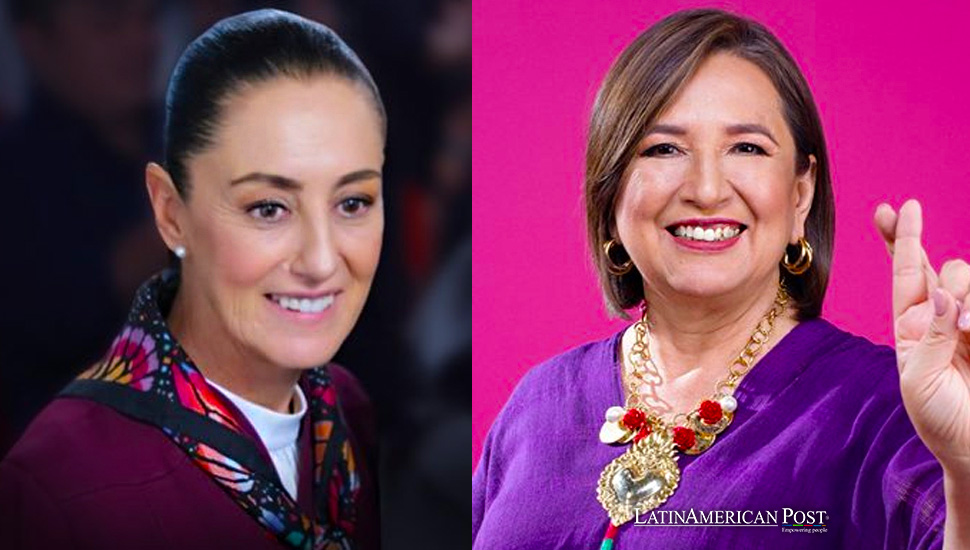Mexico’s Historic Election Polls Maintain Female Leadership in Sight

In a landmark election, Mexico’s MORENA party candidate leads the polls with 48%, signaling a potential shift in the country’s political landscape and a historic milestone for female leadership.
Sheinbaum Leads, but Polls Indicate Shifts
As Mexico approaches its presidential election, a recent poll has revealed a significant lead for Claudia Sheinbaum, the candidate from the ruling leftist MORENA party, founded by the outgoing President Andres Manuel Lopez Obrador. With 48% voter support, Sheinbaum holds a substantial 16-point lead over her closest rival, approximately four months before the election.
However, this figure marks a 6-point dip from the previous survey, suggesting a dynamic and potentially volatile electoral landscape. The poll, conducted by the renowned newspaper El Financiero, sheds light on the shifting sentiments of the Mexican electorate.
Sheinbaum’s primary competition stems from Xochitl Galvez, representing a three-party coalition encompassing a diverse ideological spectrum. Galvez, currently standing at 32% support in the polls, has seen a 2-point increase since December. This uptick indicates a tightening race as the election nears.
Alvarez Surges: Minor Party Candidate Shakes Up Politics
Jorge Alvarez, a candidate from a more minor opposition party, is also making waves in the political arena. His support has risen to 10%, a 3-point increase from last month. Meanwhile, 10% of voters remain undecided, a crucial segment that could sway the election outcome.
The upcoming vote on June 2 is not only pivotal for selecting Lopez Obrador’s successor, who is constitutionally limited to a single six-year term. It has broader implications for numerous elected positions across the country.
The prospect of Mexico electing its first female president is a historic milestone. Sheinbaum, the former mayor of Mexico City, and Galvez, a senator who has resigned to run for the presidency, are vying for this groundbreaking achievement.
In the congressional arena, MORENA maintains a lead with 40% of voter intentions for the lower chamber of Congress. However, this figure represents a 5-point decrease from December. The main opposition parties – the conservative PAN, centrist PRI, and leftist PRD – collectively stand at 31%.
Polling Uncertainty: Debates Surrounding Reliability
The reliability of polls in Mexico has been debated, given their mixed track record in predicting election outcomes. In some past elections, the final results have significantly diverged from poll predictions. This uncertainty adds an element of unpredictability to the electoral process.
The methodology of the El Financiero survey involved polling 1,000 adults through phone calls, both to landlines and mobile numbers, conducted twice in January. The margin of error for this survey is reported to be 3.1%.
As the election approaches, the political landscape in Mexico remains dynamic. The potential election of the country’s first female president would be a historic moment for Mexico and a significant event in global politics, reflecting the growing trend of female leadership in various parts of the world.
Sheinbaum’s platform, aligned with the MORENA party’s leftist ideology, focuses on continuing the policies of Lopez Obrador, emphasizing social welfare, anti-corruption measures, and a more equitable economic distribution. Her track record as the mayor of Mexico City, marked by progressive policies and infrastructural development, has been a critical element of her campaign.
Diverse Ideologies Unite
Conversely, Galvez’s campaign, representing a coalition of ideologically diverse parties, aims to offer an alternative to MORENA’s approach. Her political stance combines conservatism, centrism, and left-leaning policies, reflecting the coalition’s broad base. Galvez’s senator experience and advocacy for transparency and social justice have been central to her campaign narrative.
As Mexico’s political future hangs in the balance, the eyes of the world are on this election, not only for its potential to reshape domestic policies but also for its symbolic significance in terms of gender representation in politics. The outcome of this election could be a turning point for Mexico, setting a precedent for female leadership and altering the course of its political trajectory.
Also read: Children in the Mexican State of Guerrero Armed for Self-Defense Against Organized Crime
As the presidential race heats up, the stakes are high, and the impact of this election will resonate far beyond the borders of Mexico. It represents not just a political contest but a societal shift towards embracing diverse leadership and redefining the role of women in the highest echelons of power.





